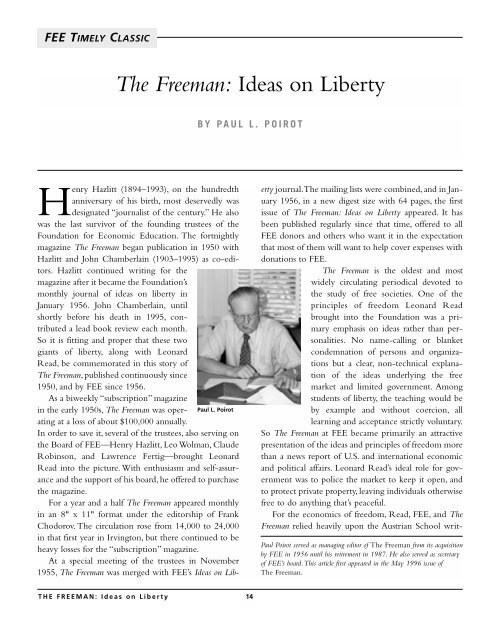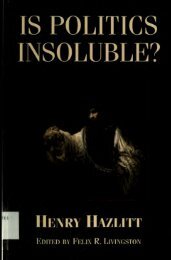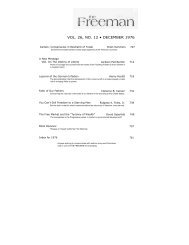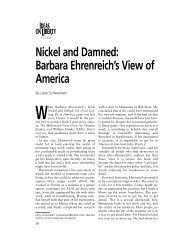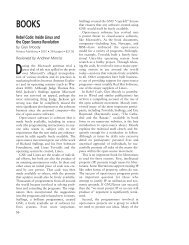You also want an ePaper? Increase the reach of your titles
YUMPU automatically turns print PDFs into web optimized ePapers that Google loves.
FEE TIMELY CLASSIC<br />
<str<strong>on</strong>g>The</str<strong>on</strong>g> <str<strong>on</strong>g>Freeman</str<strong>on</strong>g>: <str<strong>on</strong>g>Ideas</str<strong>on</strong>g> <strong>on</strong> <strong>Liberty</strong><br />
Henry Hazlitt (1894–1993), <strong>on</strong> the hundredth<br />
anniversary of his birth, most deservedly was<br />
designated “journalist of the century.” He also<br />
was the last survivor of the founding trustees of the<br />
Foundati<strong>on</strong> for Ec<strong>on</strong>omic Educati<strong>on</strong>. <str<strong>on</strong>g>The</str<strong>on</strong>g> fortnightly<br />
magazine <str<strong>on</strong>g>The</str<strong>on</strong>g> <str<strong>on</strong>g>Freeman</str<strong>on</strong>g> began publicati<strong>on</strong> in 1950 with<br />
Hazlitt and John Chamberlain (1903–1995) as co-editors.<br />
Hazlitt c<strong>on</strong>tinued writing for the<br />
magazine after it became the Foundati<strong>on</strong>’s<br />
m<strong>on</strong>thly journal of ideas <strong>on</strong> liberty in<br />
January 1956. John Chamberlain, until<br />
shortly before his death in 1995, c<strong>on</strong>tributed<br />
a lead book review each m<strong>on</strong>th.<br />
So it is fitting and proper that these two<br />
giants of liberty, al<strong>on</strong>g with Le<strong>on</strong>ard<br />
Read, be commemorated in this story of<br />
<str<strong>on</strong>g>The</str<strong>on</strong>g> <str<strong>on</strong>g>Freeman</str<strong>on</strong>g>, published c<strong>on</strong>tinuously since<br />
1950, and by FEE since 1956.<br />
As a biweekly “subscripti<strong>on</strong>” magazine<br />
in the early 1950s, <str<strong>on</strong>g>The</str<strong>on</strong>g> <str<strong>on</strong>g>Freeman</str<strong>on</strong>g> was oper- Paul L. Poirot<br />
ating at a loss of about $100,000 annually.<br />
In order to save it, several of the trustees, also serving <strong>on</strong><br />
the Board of FEE—Henry Hazlitt, Leo Wolman, Claude<br />
Robins<strong>on</strong>, and Lawrence Fertig—brought Le<strong>on</strong>ard<br />
Read into the picture. With enthusiasm and self-assurance<br />
and the support of his board, he offered to purchase<br />
the magazine.<br />
For a year and a half <str<strong>on</strong>g>The</str<strong>on</strong>g> <str<strong>on</strong>g>Freeman</str<strong>on</strong>g> appeared m<strong>on</strong>thly<br />
in an 8" x 11" format under the editorship of Frank<br />
Chodorov. <str<strong>on</strong>g>The</str<strong>on</strong>g> circulati<strong>on</strong> rose from 14,000 to 24,000<br />
in that first year in Irvingt<strong>on</strong>, but there c<strong>on</strong>tinued to be<br />
heavy losses for the “subscripti<strong>on</strong>” magazine.<br />
At a special meeting of the trustees in November<br />
1955, <str<strong>on</strong>g>The</str<strong>on</strong>g> <str<strong>on</strong>g>Freeman</str<strong>on</strong>g> was merged with FEE’s <str<strong>on</strong>g>Ideas</str<strong>on</strong>g> <strong>on</strong> Lib-<br />
THE FREEMAN: <str<strong>on</strong>g>Ideas</str<strong>on</strong>g> <strong>on</strong> <strong>Liberty</strong><br />
BY PAUL L. POIROT<br />
14<br />
erty journal.<str<strong>on</strong>g>The</str<strong>on</strong>g> mailing lists were combined, and in January<br />
1956, in a new digest size with 64 pages, the first<br />
issue of <str<strong>on</strong>g>The</str<strong>on</strong>g> <str<strong>on</strong>g>Freeman</str<strong>on</strong>g>: <str<strong>on</strong>g>Ideas</str<strong>on</strong>g> <strong>on</strong> <strong>Liberty</strong> appeared. It has<br />
been published regularly since that time, offered to all<br />
FEE d<strong>on</strong>ors and others who want it in the expectati<strong>on</strong><br />
that most of them will want to help cover expenses with<br />
d<strong>on</strong>ati<strong>on</strong>s to FEE.<br />
<str<strong>on</strong>g>The</str<strong>on</strong>g> <str<strong>on</strong>g>Freeman</str<strong>on</strong>g> is the oldest and most<br />
widely circulating periodical devoted to<br />
the study of free societies. One of the<br />
principles of freedom Le<strong>on</strong>ard Read<br />
brought into the Foundati<strong>on</strong> was a primary<br />
emphasis <strong>on</strong> ideas rather than pers<strong>on</strong>alities.<br />
No name-calling or blanket<br />
c<strong>on</strong>demnati<strong>on</strong> of pers<strong>on</strong>s and organizati<strong>on</strong>s<br />
but a clear, n<strong>on</strong>-technical explanati<strong>on</strong><br />
of the ideas underlying the free<br />
market and limited government. Am<strong>on</strong>g<br />
students of liberty, the teaching would be<br />
by example and without coerci<strong>on</strong>, all<br />
learning and acceptance strictly voluntary.<br />
So <str<strong>on</strong>g>The</str<strong>on</strong>g> <str<strong>on</strong>g>Freeman</str<strong>on</strong>g> at FEE became primarily an attractive<br />
presentati<strong>on</strong> of the ideas and principles of freedom more<br />
than a news report of U.S. and internati<strong>on</strong>al ec<strong>on</strong>omic<br />
and political affairs. Le<strong>on</strong>ard Read’s ideal role for government<br />
was to police the market to keep it open, and<br />
to protect private property, leaving individuals otherwise<br />
free to do anything that’s peaceful.<br />
For the ec<strong>on</strong>omics of freedom, Read, FEE, and <str<strong>on</strong>g>The</str<strong>on</strong>g><br />
<str<strong>on</strong>g>Freeman</str<strong>on</strong>g> relied heavily up<strong>on</strong> the Austrian School writ-<br />
Paul Poirot served as managing editor of <str<strong>on</strong>g>The</str<strong>on</strong>g> <str<strong>on</strong>g>Freeman</str<strong>on</strong>g> from its acquisiti<strong>on</strong><br />
by FEE in 1956 until his retirement in 1987. He also served as secretary<br />
of FEE’s board.This article first appeared in the May 1996 issue of<br />
<str<strong>on</strong>g>The</str<strong>on</strong>g> <str<strong>on</strong>g>Freeman</str<strong>on</strong>g>.
ings and teachings of Dr. Ludwig v<strong>on</strong> Mises. In 1938,<br />
Hazlitt introduced Mises to American audiences in a<br />
New York Times review of the book Socialism—“the most<br />
devastating analysis of the system ever written.”<br />
When Mises moved from Europe to New York City<br />
in 1940, he became a close friend of Hazlitt, of Le<strong>on</strong>ard<br />
Read, and of the Foundati<strong>on</strong>. Am<strong>on</strong>g the followers of<br />
Mises are outstanding professors such as Hans Sennholz<br />
and Israel Kirzner and a host of their students whose<br />
works also have graced <str<strong>on</strong>g>The</str<strong>on</strong>g> <str<strong>on</strong>g>Freeman</str<strong>on</strong>g>.<br />
Le<strong>on</strong>ard Read was the author most frequently seen<br />
in <str<strong>on</strong>g>The</str<strong>on</strong>g> <str<strong>on</strong>g>Freeman</str<strong>on</strong>g>, though his name appeared <strong>on</strong> the masthead<br />
not as editor but as President of FEE.<str<strong>on</strong>g>The</str<strong>on</strong>g> managing<br />
editor, of course was free to accept—or reject—the<br />
President’s offerings. Roughly half of the articles and<br />
reviews in a typical issue would have been written by<br />
the staff of FEE, a few <strong>on</strong> some special topic by commissi<strong>on</strong>,<br />
and others chosen from the many free-lance<br />
submissi<strong>on</strong>s. Now and then an entire m<strong>on</strong>thly issue<br />
might be devoted to a single topic, various authors each<br />
offering his or her special expertise, but never invited or<br />
encouraged by the editor to present opposing views.<br />
Now and then, and sometimes without alerting the editor,<br />
an astute Henry Hazlitt or Hans Sennholz or<br />
Clarence Cars<strong>on</strong> would start a topic that simply had to<br />
be c<strong>on</strong>tinued in the following issue and eventually<br />
might run to a dozen or more chapters of a book.<br />
Many of <str<strong>on</strong>g>The</str<strong>on</strong>g> <str<strong>on</strong>g>Freeman</str<strong>on</strong>g> authors over the years have<br />
been distinguished academicians in their respective fields<br />
of ec<strong>on</strong>omics, law, philosophy, political science, banking,<br />
medicine, and other disciplines. But their comm<strong>on</strong> mark<br />
of distincti<strong>on</strong> has been the capacity to express their ideas<br />
and explanati<strong>on</strong>s not in the jarg<strong>on</strong>s of their trades but in<br />
the clear language of the layman.<str<strong>on</strong>g>The</str<strong>on</strong>g>se experts from the<br />
academy have shared the pages of the journal with other<br />
experts from any and every walk of life, perhaps a housewife,<br />
a lawyer, a merchant, and yes, probably a thief, since<br />
there have been articles by pris<strong>on</strong>ers.<br />
<str<strong>on</strong>g>The</str<strong>on</strong>g> editor’s guide for acceptance was the clear evidence<br />
of the author’s understanding and capacity to shed<br />
special light <strong>on</strong> <strong>on</strong>e or another facet of liberty. Not<br />
that editors made no mistakes. But never was there an<br />
editorial view that <strong>on</strong>e “good turn,” or explanati<strong>on</strong>,<br />
deserves equal space or time for the c<strong>on</strong>trary opini<strong>on</strong>.<br />
Financial support of the Foundati<strong>on</strong> is not for the<br />
<str<strong>on</strong>g>The</str<strong>on</strong>g> <str<strong>on</strong>g>Freeman</str<strong>on</strong>g>: <str<strong>on</strong>g>Ideas</str<strong>on</strong>g> <strong>on</strong> <strong>Liberty</strong><br />
purpose of airing opini<strong>on</strong>s counter to freedom.<br />
I had joined the staff of FEE in 1949 and served as<br />
managing editor from 1956 until my retirement in 1987.<br />
Other members of the Foundati<strong>on</strong> staff, in additi<strong>on</strong> to<br />
c<strong>on</strong>tributing articles, were often c<strong>on</strong>sulted about manuscripts<br />
under c<strong>on</strong>siderati<strong>on</strong>.<br />
<str<strong>on</strong>g>The</str<strong>on</strong>g> scholarly Reverend Edmund Opitz served as<br />
book review editor and stood always at hand to lend<br />
moral and spiritual guidance. He also had a firm understanding<br />
of ec<strong>on</strong>omic issues.<br />
Mrs. Bettina Bien Greaves was well schooled in “the<br />
gospel according to Mises,” helping to look for “leaks”<br />
in any article. She also was the expert expected, and willing,<br />
to research any questi<strong>on</strong>able fact or opini<strong>on</strong>.<br />
W. M. Curtiss saw to business and financial affairs to<br />
cover authors’ fees, printing bills, and other costs of <str<strong>on</strong>g>The</str<strong>on</strong>g><br />
<str<strong>on</strong>g>Freeman</str<strong>on</strong>g>. He also had the time and wisdom to help<br />
decide which articles seemed best.<br />
<str<strong>on</strong>g>The</str<strong>on</strong>g> Post-Read Era<br />
Robert Anders<strong>on</strong> gave up college teaching to rejoin<br />
the staff as business manager when Curtiss retired.<br />
Like Curtiss, Bob found time now and then to draft an<br />
article, always excellent. After Le<strong>on</strong>ard Read’s death in<br />
1983, Bob was there to help hold the standard during a<br />
successi<strong>on</strong> of presidents until Dr. Sennholz agreed to<br />
assume that positi<strong>on</strong>. But perhaps the outstanding c<strong>on</strong>tributi<strong>on</strong><br />
Bob Anders<strong>on</strong> made to <str<strong>on</strong>g>The</str<strong>on</strong>g> <str<strong>on</strong>g>Freeman</str<strong>on</strong>g> was to<br />
bring Beth (Herbener) Hoffman aboard as producti<strong>on</strong><br />
editor. Eventually she became managing editor, with<br />
guest editors . . . helping to compile each issue....<br />
Aside from the memory banks of a Beth or a Bettina,<br />
there has been no cumulative index of topics covered<br />
in the pages of <str<strong>on</strong>g>The</str<strong>on</strong>g> <str<strong>on</strong>g>Freeman</str<strong>on</strong>g>. But the value of those back<br />
issues as a reference shelf is not to be denied.This is why<br />
numerous readers over the years have spoken with pride<br />
of their m<strong>on</strong>thly files, or annual bound volumes, or<br />
both.<str<strong>on</strong>g>The</str<strong>on</strong>g> reader fortunate enough to have accumulated<br />
a complete set since 1956 now possesses a total of 485<br />
issues, or more than 30,000 pages or over 14 milli<strong>on</strong><br />
words of text skillfully crafted into essays by more than<br />
1,400 different authors explaining the many aspects of<br />
freedom.<br />
Dr. Clarence Cars<strong>on</strong> [deceased 2003] is <strong>on</strong>e of those<br />
who has written articles in a series in <str<strong>on</strong>g>The</str<strong>on</strong>g> <str<strong>on</strong>g>Freeman</str<strong>on</strong>g>. Early<br />
15 JANUARY/FEBRUARY 2006
Paul L. Poirot<br />
<strong>on</strong>, he offered <str<strong>on</strong>g>The</str<strong>on</strong>g> American Traditi<strong>on</strong> with chapters <strong>on</strong><br />
c<strong>on</strong>stituti<strong>on</strong>alism, republican government, federalism,<br />
individualism, equality, rights and resp<strong>on</strong>sibilities, voluntarism,<br />
free trade, internati<strong>on</strong>alism, virtue and morality,<br />
and so <strong>on</strong>. In a sense, his list covered the subjects most<br />
often tackled in <str<strong>on</strong>g>The</str<strong>on</strong>g> <str<strong>on</strong>g>Freeman</str<strong>on</strong>g>. In a later series, he<br />
described <str<strong>on</strong>g>The</str<strong>on</strong>g> Flight from Reality, the departure from traditi<strong>on</strong>,<br />
beginning in the mind of the reformer—the<br />
intellectual turn—then emerging as the domesticati<strong>on</strong><br />
of socialism, capturing and remaking the hearts of men,<br />
and finally manifesting as a political flight.<br />
In more recent years, especially at the nudging of Dr.<br />
Sennholz, FEE has published a regular series of <str<strong>on</strong>g>Freeman</str<strong>on</strong>g><br />
“classic” books. Each volume is devoted to a given subject<br />
and draws from the wealth of knowledge c<strong>on</strong>tained<br />
in some forty years of <str<strong>on</strong>g>The</str<strong>on</strong>g> <str<strong>on</strong>g>Freeman</str<strong>on</strong>g>. Having started with<br />
THE FREEMAN: <str<strong>on</strong>g>Ideas</str<strong>on</strong>g> <strong>on</strong> <strong>Liberty</strong><br />
16<br />
<str<strong>on</strong>g>The</str<strong>on</strong>g> Freedom Philosophy, the series c<strong>on</strong>tains books covering<br />
a wide range of ideas, including: the moral foundati<strong>on</strong>s<br />
of capitalism, political interventi<strong>on</strong>ism, individual<br />
spirit, free trade and world peace, the formati<strong>on</strong> and<br />
functi<strong>on</strong> of market pricing, m<strong>on</strong>ey, inflati<strong>on</strong>, banking,<br />
private property rights, taxati<strong>on</strong>, c<strong>on</strong>servati<strong>on</strong> of<br />
resources, educati<strong>on</strong>, medical care, agriculture, uni<strong>on</strong>ism,<br />
crime, and more.<br />
<str<strong>on</strong>g>The</str<strong>on</strong>g> <str<strong>on</strong>g>Freeman</str<strong>on</strong>g> since 1950 c<strong>on</strong>sistently and c<strong>on</strong>tinuously<br />
has stood against the fallacies and clichés of politics,<br />
not by bitter denunciati<strong>on</strong>, but by reas<strong>on</strong>ed and attractive<br />
explanati<strong>on</strong>s of the better way of limited government,<br />
private ownership, voluntary exchange, moral<br />
behavior, and self-improvement.<str<strong>on</strong>g>The</str<strong>on</strong>g> golden rule of the<br />
marketplace is that the pers<strong>on</strong> who gains most is <strong>on</strong>e<br />
who best serves others.<br />
“<str<strong>on</strong>g>The</str<strong>on</strong>g> ideas of liberty are compelling, but they must have a platform from which they can reach the<br />
public effectively. For fifty years <str<strong>on</strong>g>The</str<strong>on</strong>g> <str<strong>on</strong>g>Freeman</str<strong>on</strong>g> has been uniquely effective in taking the freedom<br />
philosophy to milli<strong>on</strong>s of people. As important as this role was in the last half century, the challenges<br />
facing liberty today mean that such a role will be even more important in the coming years. All of us at<br />
the Institute for Justice join in sending c<strong>on</strong>gratulati<strong>on</strong>s and best wishes to <str<strong>on</strong>g>The</str<strong>on</strong>g> <str<strong>on</strong>g>Freeman</str<strong>on</strong>g> and FEE.<br />
—Chip Mellor<br />
President, Institute for Justice


